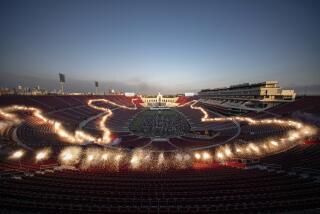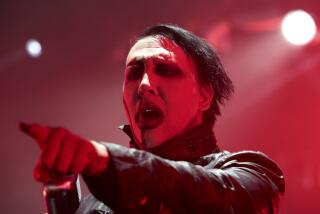Pop Singer Morrissey Blamed for Melee : Violence: UCLA and a promoter say he should not have urged the crowd to move in closer. The rush injured 48 people.
- Share via
On the day after 48 people were hurt in a sudden rush toward the stage at a Pauley Pavilion concert, UCLA officials and a concert promoter blamed English pop singer Morrissey for the melee, saying he should not have urged the audience to move in closer.
Morrissey’s invitation to “get up out of your seats” and “come down here” prompted a massive surge, officials said, forcing people at the front of the audience against wooden barriers near the stage and touching off near-panic.
“He invited people forward,” UCLA spokeswoman Celesta Billeci said. “At the point he did that, everything fell apart. . . . Once an artist does that, it’s a little difficult to stop it.”
Avalon Attractions President Brian Murphy, who promoted the concert, agreed.
“The show was going along wonderfully up to that point,” Murphy said. “This was a crowd that really idolizes the artist. I think they would have done whatever he asked. . . . So when he said come on forward, that’s what they did.”
After the concert was halted, the promoter said that Morrissey agonized about his mistake and whether he should go back out and talk to the crowd.
“He was visibly upset at what had happened,” he said. “It was his decision not to go back on stage because he feared that what was started could not be stopped.”
Immediately after Morrissey summoned the crowd forward, some people jumped on stage to hug him while others trapped below the platform began screaming. Officials escorted the singer and his band off the stage, turned on the house lights and ordered the crowd to back away from the stage.
An hour later, when Morrissey had not returned, officials ordered the crowd to disperse. Outside, angry fans knocked down a souvenir sales tent and stole concert T-shirts and posters, witnesses said.
The concert was the first rock event at Pauley in a decade. UCLA officials said they will investigate Friday’s incident before deciding whether to stage future rock shows.
In all, 22 people were treated and released at UCLA Medical Center for a variety of minor injuries, most of them cuts and bruises, a hospital spokeswoman said. Fire officials said 26 others were treated at the scene.
Seventeen-year-old concert-goer Joan Moriarty said in an interview Saturday that security guards shoved the audience out of the pavilion. On her way out, she said, she saw a campus police officer wearing a riot helmet repeatedly strike a young girl’s back and legs with a baton as she screamed on the ground.
A second police officer grabbed a camera from a photographer recording the incident, Moriarty said, and slammed the camera to the pavement, shattering its lens.
UCLA spokeswoman Billeci, who attended the concert, said she did not observe any violence nor did officers report any. Campus police officials could not be reached for comment.
Morrissey, a founding member of the English cult band the Smiths who went solo two years ago, also could not be reached Saturday.
Music critics have described his concerts as intensely emotional affairs, with fans tossing hundreds of flowers on stage while he writhes and moans--often shirtless--through his bitter, fatalistic and compassionate lyrics.
“If he himself had gone out there and said, ‘Hey, look, here I am, you want to hear me sing? Back off and sit down,’ we all would have done it,” said Moriarty. “I know I would do whatever he said to hear him sing.”
The Pauley Pavilion disturbance marked the fourth incident of unruly behavior in the Westwood area in the last 15 months.
Last May, at least 500 youths rampaged through the village after UCLA’s annual Mardi Gras celebration, tossing bricks through windows and looting stores.
On March 9, a mob that had been denied entrance to the just-released movie “New Jack City” went on a window-smashing spree, lobbing beer cans and tree branches through shop windows and looting the area.
And in August, 1990, a series of fights broke out in Westwood Village between groups of youths waiting to see director Spike Lee’s movie, “Mo’ Better Blues.”
City Councilman Zev Yaroslavsky, who represents the area, said Saturday he does not believe the concert melee marks a return of violence to Westwood.
“This has nothing to do with Westwood,” Yaroslavsky said. “This could just as easily have happened at the Sports Arena or the Forum. . . . This was simply a case of bad judgment by an entertainer. The guy should have kept his mouth shut instead of asking for trouble.”
Yaroslavsky said the night life in Westwood has “stabilized tremendously” in recent weeks, and that Westwood theater operators are avoiding movies that could prompt violent outbursts.
On Friday officials plan to end a five-year program of putting up barriers on major streets each weekend night to control crowds.
Yaroslavsky said he wants to investigate Friday night’s incident before deciding whether any more rock concerts should take place there. “The university has been cooperative,” he said. “I’m sure we’ll all be talking about this.”
More to Read
Sign up for Essential California
The most important California stories and recommendations in your inbox every morning.
You may occasionally receive promotional content from the Los Angeles Times.









